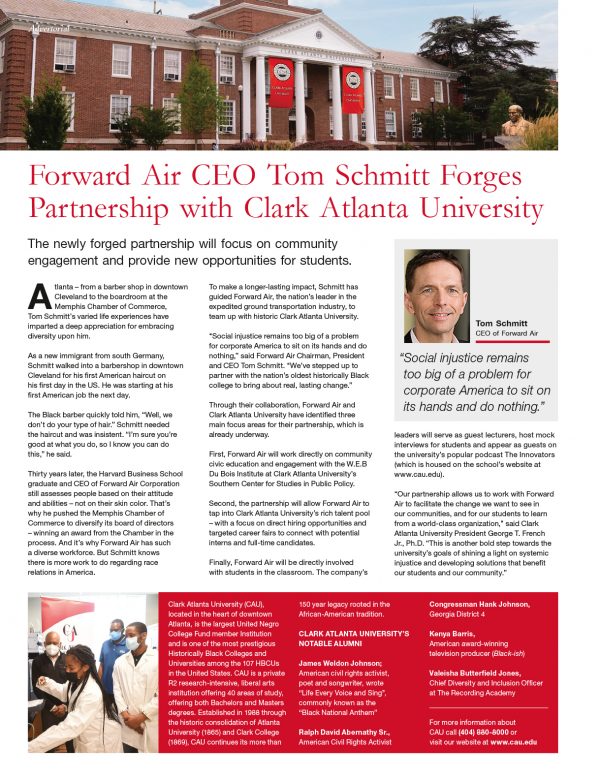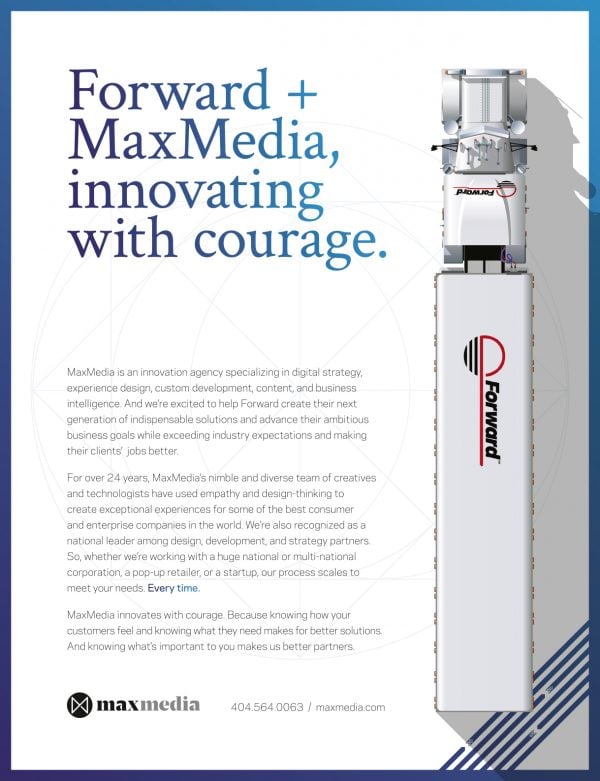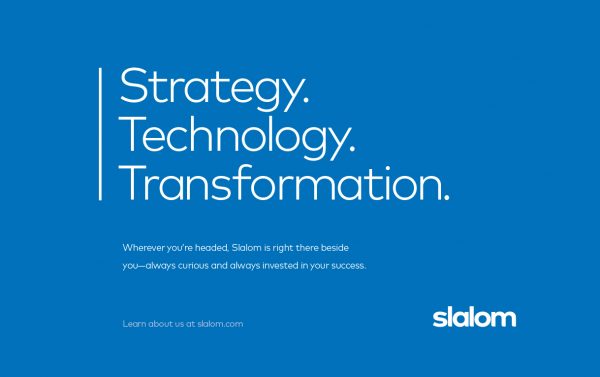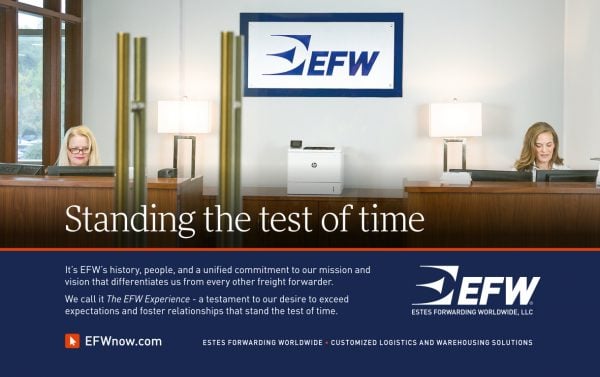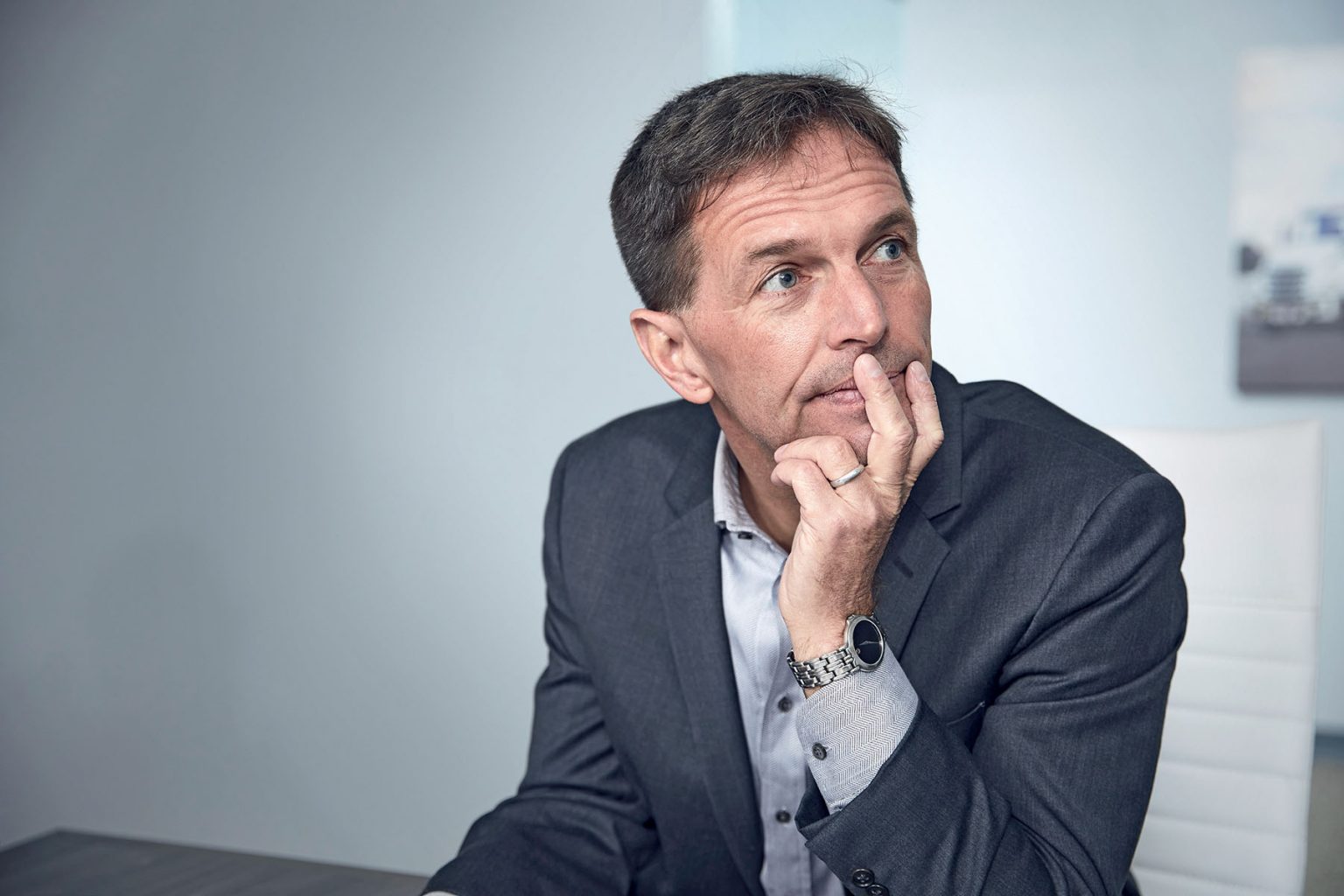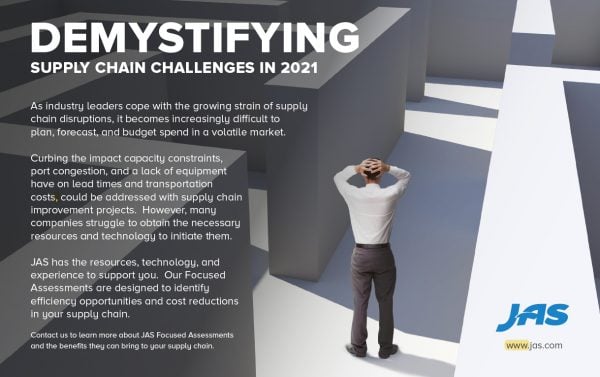Almost three decades ago, air freight transportation had something of a problem. Freight was typically transported in passenger aircraft, but passenger luggage took priority, meaning that sometimes air freight would get bumped back to later flights.
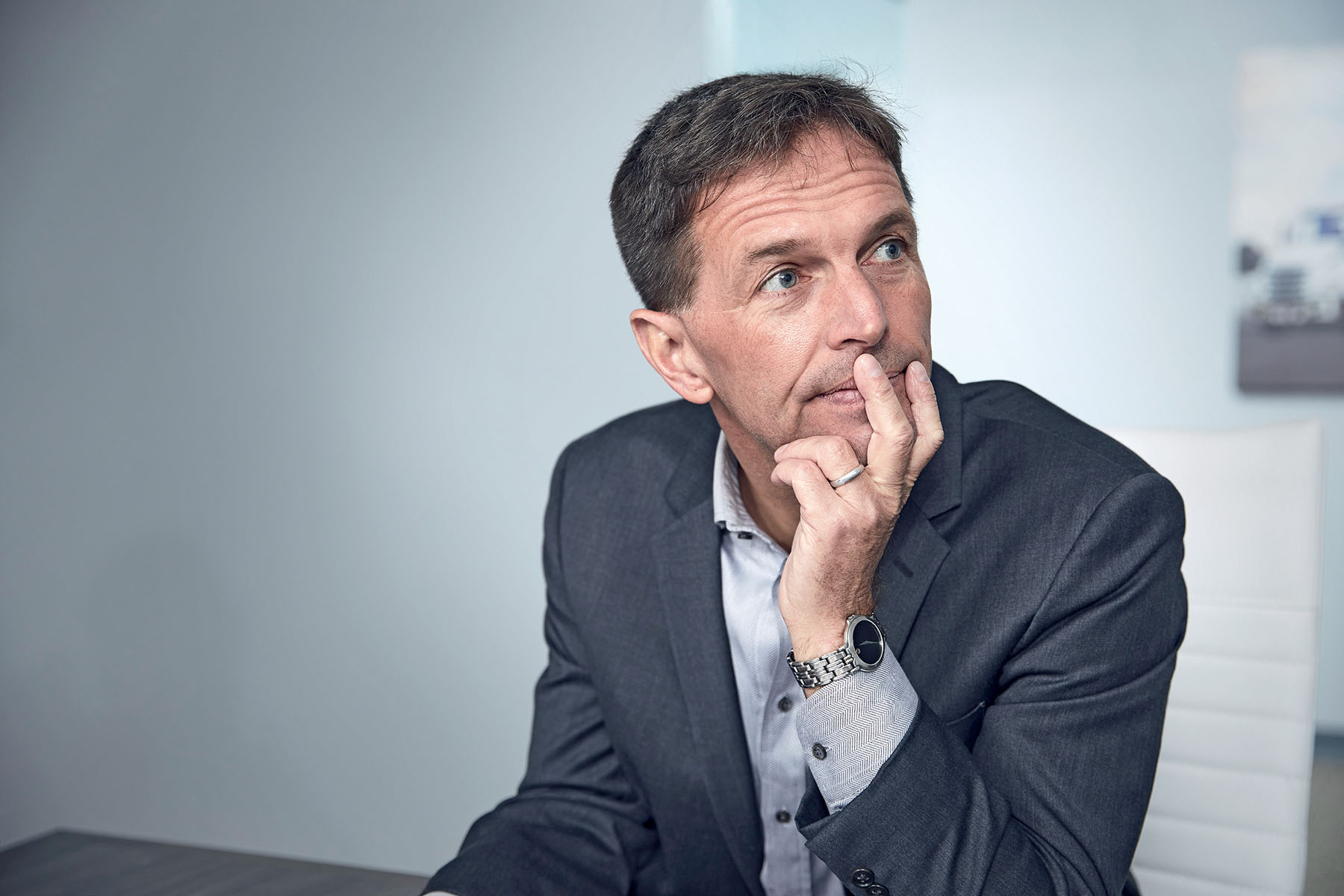
Not the most efficient method of transportation. Around that time, a company was created with the intent of eliminating this inconvenience. Forward Air was born around the idea of transporting this air freight over land instead.
The company’s current Chair and CEO, Tom Schmitt, wasn’t around back in those days, but he’s come to know the people behind that initial vision in the two years since he joined the business. “One was my predecessor and the other one was the Founder of the company, both of whom I obviously know well,” Tom says.
“They came up with, as is often the case, a very simple and very compelling idea. If you look at success stories in our space or in any other space, they are often based on very simple ideas.
“Over the next 20 years, 93 Forward Air terminals were established in places where air freight was forwarded on the ground. Over short distances, it replicated those same schedules that the freight would have had via air, at a much lower cost. It was much more viable because freight didn’t get bumped due to too many suitcases.
“It’s also much more environmentally responsible because a truck mile has less carbon emissions than an aeroplane mile. So air freight is a triple whammy from a cost, a reliability and an environmental perspective. Transporting via truck is great for the airlines, because they get a cost-positive release valve, and for the next 20 years, Forward Air earned very good margins.”
It also boasted a considerably lower damage ratio for freight that would often be high-value, physically sensitive devices such as laptops. What’s more, as Forward Air continued to strengthen its competency in its core service, it expanded that service, performing delivery before and after the airport, rather than solely serving as a replacement for freight transport by air.
If you take care of your own people, they go above and beyond delivering exceptional service and the logical consequence is profit.
The business gradually moved into high-precision execution, offering final mile door-to-door deliveries, and deliveries to fashion retailers at the mall, or residential customers. So when Tom eventually got a chance to join Forward Air, he was well aware of the business and how it had grown over the decades to offer more and better services.
“It’s a great little American jewel – we celebrated 25 years on the Nasdaq two years ago,” he says. “I felt it had a great people culture and a solid business model. I am lucky to be here.
“I mean, transportation is a small world. Between five years at McKinsey, 12 years at FedEx, two years at Purolator in Canada, and three years at DB Schenker in a global role, you get to know everybody and everybody gets to know you. When you build a profitable growth track record with teams that you work with on a consistent basis, you do get fortunate. People tap you. And so I have been fortunate to lead wonderful teams.”
But Tom never would have embarked upon this career across transportation if he hadn’t moved to the US in the 1990s. He describes himself as born in the south, though he doesn’t mean in the sense of Atlanta or Memphis, where’s he been based over the past few decades.
Tom was in fact born in the south of Germany. In contrast to his own path, his parents had never left their hometown and hadn’t been to college, but he says they imparted a sense of decency and goodness to him, while having the confidence he’d figure things out. And eventually he did, deciding that America was the place for him.
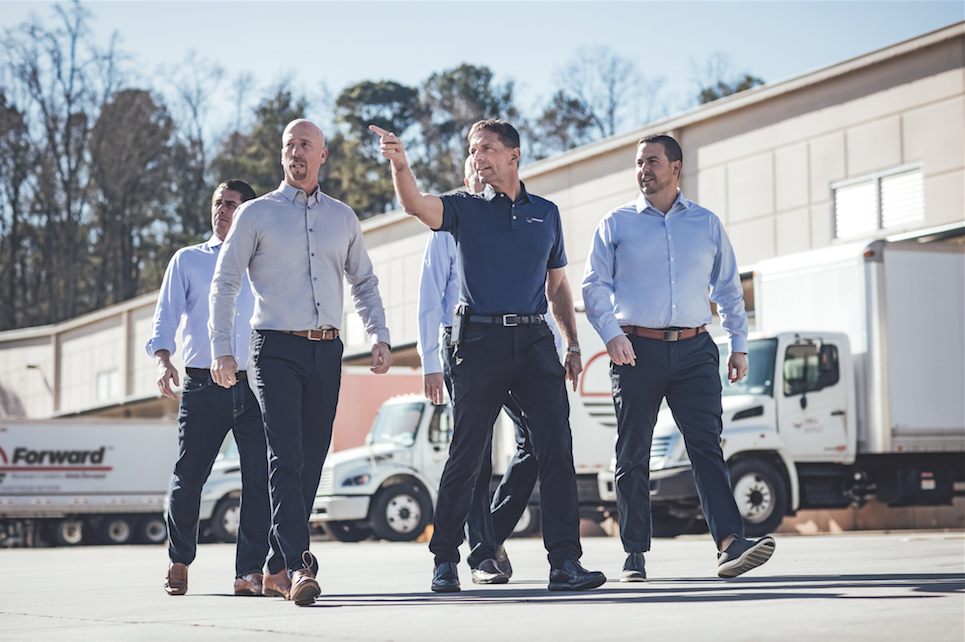
Tom was inspired by Casey Kasem’s American Top 40 and the American Forces Network; he says these conveyed a can-do culture in America, where people are more focused on how to make something happen, instead of why it can’t be done.
From a young age, therefore, he decided he wanted to be part of that culture. Briefly, Tom did flirt with the idea of teaching Latin and English, but after being informed there were already too few jobs in the field, he switched gears into international business, studying in the UK.
During an internship with British Petroleum, he was offered a full-time job with the company – he accepted, only on the condition that he’d be able to move to a position in the US as soon as possible. BP agreed, and Tom says an important lesson on commitment followed, when a few months later, he was invited to take up a position in the US.
“In London, I did lots of spreadsheets, analyzing how many millions of dollars BP should be putting into station design and in which country. Lots of paper pushing. Then, in Cleveland, I was a 24-year- old with a heavy German accent directing experienced retail gas station managers, telling them what to do. It was a great learning experience. When you are well intending and somewhat competent, it’s amazing what can happen. And we did a great job.”
Tom was often ranked among the best territory managers for BP, based on metrics around sales, profits and inventory loss. “When you put in sweat equity and you are fortunate enough to have the backing of competent teams, you can actually do great things,” he explains.
We are now one of the top five players in final-mile, high-value, instant installations of appliances in homes across the US.
“Then I joined FedEx. I had a lot of energy and a tremendous brand name behind me, and Memphis [where he was the youngest senior officer for FedEx] was big enough so that when you did something, it mattered. But it was also small enough so that if you raised your hand, people actually looked at you and did call you – and made you stretch to make a difference.”
Through the crisis
When the COVID-19 pandemic hit last year, Forward Air, like any other company, was affected. Tom outlines three kinds of companies in this environment – those that were hit hardest and struggled, like hospitality and airlines; those that have thrived, like Zoom; and those in the “vast middle”, which are still seeing success in spite of the difficulty.
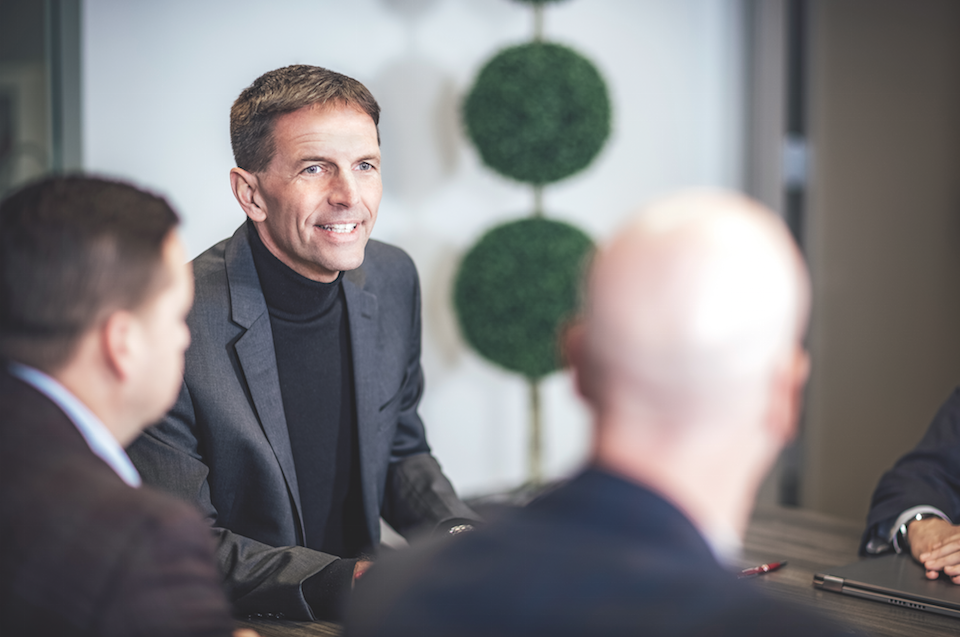
Tom puts Forward Air into this last category, in part because of its strong background as one of the fastest transporters of highly sensitive goods.
The company’s stock price dropped 40% at one point, but in the latter half of 2020, the company’s leadership was characterized by “focused, better consciousness, more direct decisions, short and good debates, and then action”, he says.
The first step was to get growth happening again, bring back its 3,000 furloughed employees as quickly as possible. “I said, we’re not going to make 2020 a pause year. We don’t wait. We’re going to keep going,” he explains.
“We had three acquisitions in 2020, and we just acquired another business in February. We’ll have two or three more acquisitions this year, so we’re not done yet. I also mandated and I said half-jokingly, half-seriously: I’ll ban the word ‘wait’. We don’t wait. Because 3,000 employees were furloughed in March, and we need to bring them back. We don’t wait for airlines and cruise lines to start having more business again; that’ll be a year or more from now. We’re building things now.”
To maintain its success, Forward Air pushed its three-decade story of success, communicating to the world its triumphs and maintaining the confidence of customers, the board and employees alike. Sales support was also enhanced to the same degree that the company drove its freight transportation capabilities.
I do believe when you have solid dna, when you have competent people and leadership that actually asks for stretches, you’re going to be better.
Although stock prices may not reflect this, Tom believes Forward Air has done a terrific job rebuilding its business better – and in 2021, the stock price started reflecting that.
“30% of our most profitable business went to sleep,” he says. “We pulled some levers to offer more essential services, more medical supplies, more hospitality – all the things that we didn’t do a lot of before, it was just dialed up. Right now, as we sit here, nearly a year after the pandemic and lockdown, we have more LTL.
“We are now one of the top five players in final mile, high-value, instant installations of appliances in homes across the US. But the best accomplishment is the one we’ll be celebrating a few months from now, which is the way we’re setting up this company to be the fastest in those high-value spaces that dropped off during the pandemic. Over the past year, we’ve increased our efforts to build a second leg in this company, with more precision execution, more focus, more consciousness, better decision-making and shorter runways to take action. As business continues to return from the pandemic, we will be primed to deliver world-class speed and service, and bring our original high-value event logistics back together with our customers.”
Tom’s optimism for Forward Air’s next few years comes with a clear vision for the future. “Some of what you will see in three years or so is a company that’s several times the size of what it is today, in terms of profitability and with double-digit margins,” he predicts.
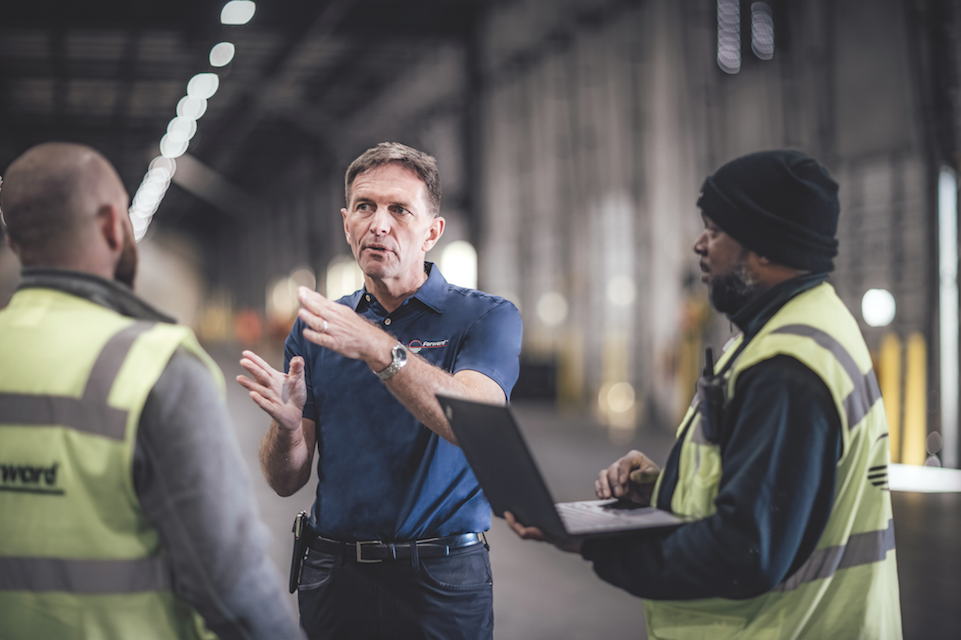
“We will be a number one or two player in spaces around final-mile, high-value appliances, delivery and installations, for example. We will also be doing much more north of the border and south of the border.”
He anticipates that commercial strategies in the US will soon follow a pattern that he’s observed in Asia. When manufacturing in Asia first kicked off, it was focused on populous coastal cities in China and as these cities became congested, manufacturing moved inland and then eventually to countries like Vietnam, Indonesia and Bangladesh when wages began to rise in China.
Soon, Tom believes, manufacturing and other businesses will begin to move back to Mexico and Canada, a process called nearshoring. As Forward Air moves to take advantage of this transformation in nearby economies, he paints a clear picture for the next few years of the company.
Leaders who don’t communicate with their teams aren’t helping their companies. I believe we’re better off when my teammates have the same knowledge as me.
“Our victory snapshot for 2023, when The CEO Magazine writes its next article about this American jewel that took off, it will talk about us being a leader in everything we do – the fastest, most reliable engine of moving America forward for any freight that’s bigger than a box. We’ll be doing that at a size that’s several times the size it is today, still at doubledigit margins and moving more in and out of Canada and Mexico into the US.”
The people behind Forward Air
The success that Forward Air has seen through Tom is a credit to its culture and people. “I do believe when you have solid DNA, when you have competent people and leadership that actually asks for stretches, you’re going to be better,” he says.
“I think, we as a company over the past year have been better than we were for the previous 18 months. I can’t speak for all the decades that I wasn’t here, but I can speak for the past two years. Great companies got better since the pandemic because they chose to do so.”
Tom puts a lot of work into ensuring a culture of discussion and collaboration. One element of this strategy involves writing an email each Saturday to the employees and board of directors.

He stresses it’s a task he’s committed to; it’s not a way to pass the time, but a regular form of communication intended to bring the team together and convey a snapshot of where the company is heading, whether that’s a recent acquisition or an outstanding achievement by one of Forward Air’s teams.
“They add up to a story,” Tom says of the communiques. “They’re also very genuine. I tell them what I see. I’m a strong believer that when I’ve got a team, and their view of the game plan and my view of the game plan is the same, the odds of us all going in the same direction just go way up. Leaders who don’t communicate with their teams aren’t helping their companies. I believe we’re better off when my teammates have the same knowledge as me.
“Using knowledge as power because you know more, so your job is more secure; that’s very shortterm, bad thinking. You stretch yourself by surrounding yourself with people that are, in significant ways, better than you are. And you need to have the courage to actually use that as a team sport to make each other better.”
These emails, Tom reveals, have also created an information flow, a back and forth between himself and the Forward Air team. Once he’d enacted these, his team realized that he actually wanted to hear their thoughts in response. It is, he says, a “cultural appeal to build transparency” and it goes way back to his FedEx days.
Positive partnerships
Forward Air prides itself on forging strong relationships with its suppliers which is very much part of its ongoing success.
Tom’s vision for Forward is really exciting. He’s assembled the right people to position Forward as a tech leader and to redefine innovation and customer experience across their whole industry. – Keehln Wheeler, President/CEO, MaxMedia
“From a culture and core values perspective, our teams are very aligned. Our people enjoy working closely with Tom and the Forward Air group to create interesting, meaningful work that has enabled Forward Air to reach for and realize its vision.” – John Tobin, Chief Experience Officer, Slalom
From executing high-level executive strategies, to building strong local relationships, and everything in between – Forward Air is a partner in the truest sense of the word. Their commitment to excellence aligns with EFW’s mission of exceeding expectations each and every time. – Scott Fisher, President/CEO, EFW
“If you take care of your own people, they go above and beyond delivering exceptional service and the logical consequence is profit,” he insists. “People, service, profit – in that sequence.” And in the pursuit of this, the company works with partners that can help drive its own consistent excellence, benefiting customers, employees and Forward Air alike.
“We want to make sure we maximize the professional franchise of our own people in support of our company, but also in support of their own professional franchise. So we hook up with partners that know how to work with the best,” Tom says.
“My whole notion is, when you talk about establishing strong, successful partnerships, whether it’s our own people or our customers, we always look at how we can become most compelling to the best in their respective industries.
That’s what keeps us sharp and makes us sharper on an ongoing basis. When you deal with some of these top companies, it may not always feel like a walk in the park, but it shouldn’t.
“I sometimes tell people, ‘This can be like medicine. It tastes bitter, but it makes you healthier and better on the job.’ When you work with these companies, then you get to their standards.”
Proudly supported by:
